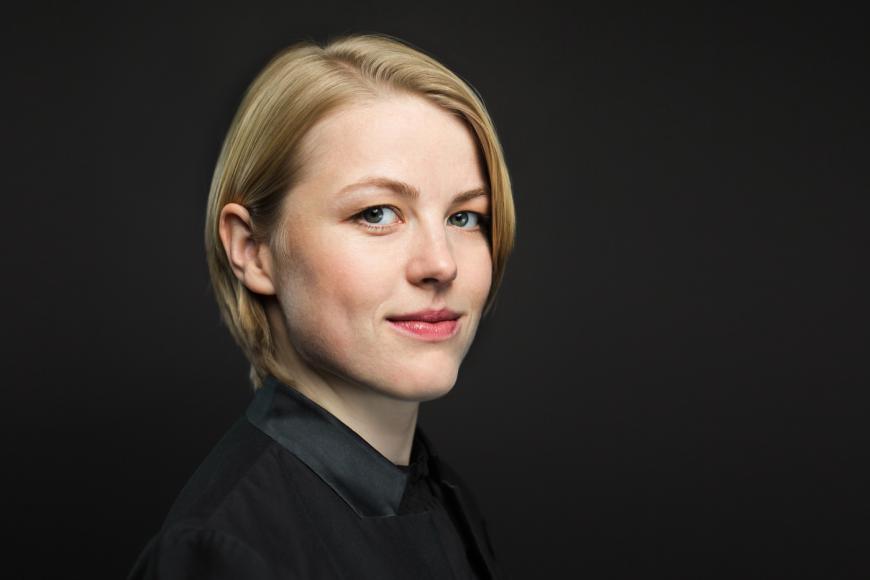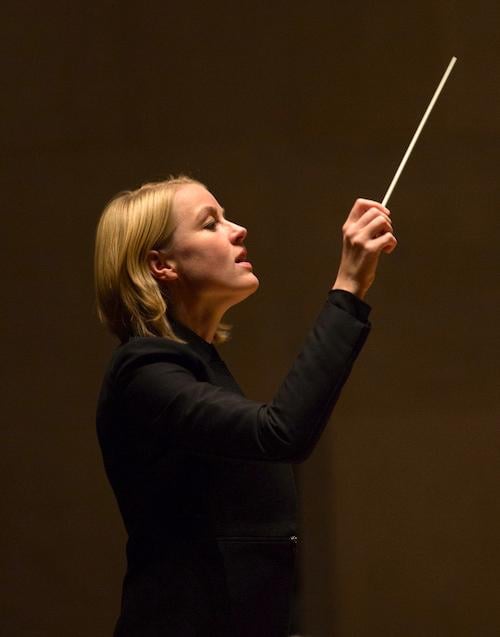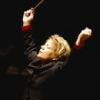
She may have composed and conducted her own opera as a teenager, but for Ruth Reinhardt, 33, it’s conducting that has taken center stage since earning a master’s degree in that field from the Juilliard School, where she studied with Alan Gilbert. Making her debut with the San Francisco Symphony June 2–5, Reinhardt will be leading a program of works by Lotta Wennäkoski, Mason Bates, and Antonín Dvořák.
Born in Saarbrücken, Germany, Reinhardt began studying violin at an early age and sang in the children’s chorus of the Saarländisches State Theater. She’s also part of a new generation of female conductors taking her place on the podium. The German musician, who makes her home between Germany, France, and Switzerland, has been the assistant conductor of the Dallas Symphony under Jaap van Zweden (he’s currently the music director of the New York Philharmonic), as well as having been a Dudamel Fellow of the Los Angeles Philharmonic.
In addition, Reinhardt was a conducting fellow at the Seattle Symphony (2015–2016), and in 2018, Melinda Bargreen wrote in The Seattle Times that she “proved an adept accompanist in the Tchaikovsky, but the rest of the program made it clear that she also is a conductor with strong ideas of her own.” Other highlights of Reinhardt’s career include appearances with the Detroit Symphony, The Cleveland Orchestra, and Los Angeles Chamber Orchestra.
I had the opportunity to catch up with Reinhardt, who was in Zürich, where she was taking a breather from having led orchestras in San Diego and Milwaukee before heading over the pond again to San Francisco. Our conversation included, among other topics, her attraction to new music and her process of learning a piece.
How do you cope with all the travel, and are you hoping for a permanent position with an orchestra?
I’ve only been home for 10 days, but it’s part of the deal. I’m still waiting for a day when you can beam yourself from place to place. Seriously, it’s not fun; it’s just what it is, and the more you do it, the more ways you find to cope with it. Just little things help, because at some point you start figuring out what the good restaurants are in airports. [As for] a permanent position, yes and no, because there’s ups and downs with those, too.
Okay, so let’s go back a few years: Was there music in your family, and can you talk about composing and conducting an opera when you were a mere teenager?
There was music in my family, but no professional musicians. My parents enjoy music, and sometimes at home we would listen to something, but more in the background, not consciously. No one ever thought we should become musicians, but my sister played violin first. She’s older than me and I wanted to do the same. I enjoyed it. And, yes, I did actually compose an opera for children. I started it when I was 16, but it took a while to write the script and I was almost 18 when I performed it.
That would seem an auspicious start to writing and conducting your own works, but you chose not to continue composing. Why?

The reason I stopped composing was that I started conducting when I was 16 and I really, really loved opera since I was 9. So, I joined a children’s choir at the opera house, and as part of that, Otello, by Verdi, was my first production.
It blew my mind. If you’re nine and playing the violin, it’s completely different, playing by yourself at home, or with a pianist, but being onstage with a chorus, an amazing cast of singers, lighting, there’s everything, a great orchestra, conductor. When I started conducting, I knew what I wanted — and loved — to do the most, was to conduct an opera, so I created my own.
Beforehand, I was writing chamber music, or short orchestra pieces, not necessarily with the aim of having them performed at Wigmore Hall. I was trying to figure out how to deal with structure and form. But then, I just wanted to focus on conducting, because it was my main passion. By composing since I was a kid or a teenager, without knowing it, I gave myself good training. When later I went to university, conducting was quite easy for me, the ear training and analysis part.
What are your thoughts on making your debut with the San Francisco Symphony, with pianist Daniil Trifonov, who’s playing the West Coast premiere of Mason Bates’s Piano Concerto, and have you worked with him before?
I’m super excited about this because it’s such a great orchestra. I worked with Daniil a year and a half ago with thhe Deutsche Kammerphilharmonie Bremen. We did Beethoven’s Third Piano Concerto and it was supposed to be Brahms’s First, but it was such a great experience, because we got on really well. The orchestra is so quick at adjusting and it was so much fun. Everybody was so alert and quick in reacting.
What attracts you to new music and what do you like about accompanying a soloist?
I’ve always played new music. I spent two summers at the Lucerne Festival Academy, where they only do contemporary music. I enjoy the freedom that it gives you. And usually there are not that many traditions with a new piece yet, and I find that really liberating.
With accompanying, I really, really love it and do want to be good at it. It’s something I keep trying to get better at because it’s such an interesting thing. Usually, as a conductor, you have to be commanding and clear, of course, and be leading, even when you’re accompanying. But at the same time, you have to be attuned with the soloist. You figure out when it’s your turn to speak up and lead, when it’s your turn to accommodate.
When I was young, I thought of accompanying as following. That’s completely wrong. It’s trying to be empathetic and trying to understand what the soloist is going to do. You anticipate that and join into that. With Daniil, it’s super interesting, because the last time he gave an idea and we took it and responded. Sometimes we get an idea and he picks up on it and answers it. And that’s super special, when somebody’s so flexible.
You were a conducting fellow at Boston Symphony Orchestra’s Tanglewood Music Center in 2015, assistant conductor with Dallas Symphony under Jaap van Zweden from 2016 through 2018, and a Dudamel Fellow in 2017. What did you take away from those experiences?
I learned so much, particularly in Dallas, because I was there for the longest time. The others weren’t full time. Still, I got many great impressions. In Dallas, I lived there, I did so many concerts myself, 11 weeks. It was crazy. With Jaap, I learned so much spending time with him, being in his rehearsals, and they were nice to give me a lot of freedom.
Women are decidedly making headway in the male-dominated field of conducting, but you’ve said that your generation is perhaps the first to get equal opportunities to develop and grow. Can you please elaborate?
For me, I never felt I was excluded from any program based on my gender. I got into [Zurich’s] University [of the Arts] for my bachelor’s and my master’s [at Juilliard]. The first jobs were in Seattle and Dallas and there were also other auditions. I don’t ever feel discriminated [against] based on my gender. But if you don’t get into good programs, have the best teachers, the best environments, it’s much more difficult to succeed. At least for my generation — and I don’t know when it changed — it’s not an issue.
In a way, my generation or the generation that is up to age 40, there’s a ton of young female conductors and it’s only a matter of time, hopefully, that they will get good positions. I cannot see into peoples’ heads, but time will tell.
What’s your process in learning a work?
I go big to small. I get an overview first, just so I don’t get stuck in the beginning. I’m without a piano, I’m just at a table, analyzing it, looking at it, reading it, and the next step is at the piano. I go through it slowly and sometimes I don’t have to go through everything. I’m an amateur violinist, so I also like to play stuff on the violin to get a sense of the piece. My muscle memory is stronger than my imaginative memory. If I just imagine a phrase, it doesn’t stick quite as well if I don’t play it physically.
At some point, I’m going through it and analyzing more. It depends on the piece. With a contemporary piece, there’s not much background. With Dvořák or Scheherazade [for example], I spend as much time reading a lot of the stories about the piece as I spend studying the music. With a solo work, I listen to quite a lot of recordings, to see what different soloists are doing.
On the San Francisco bill, Mason Bates’s work will have its West Coast premiere. Do you ever get opening night jitters?
No. Most conductors don’t get them. I think we get opening rehearsal nerves. I think that’s universal. We are not facing the audience; we’re interacting with the players. In most places, if you only make a small mistake, it won’t derail the entire thing. But in rehearsals, you don’t know what to expect, what the issues are going to be. You have to be fast at prioritizing in the moment, analyzing, figuring out, “How do I get everybody on board with my ideas?”
You can force them, but it will never be the same as if you convince them. If everybody is wanting to do it that way, then it makes sense. Then there’s how to deal with the different personalities. If you don’t know the orchestra, you have to figure it out on the fly.
It seems that you’ve figured out a number of things, so what advice would you give young girls who might wish to follow in your footsteps?
You’ve just got to do it. If you really feel strongly about it, if you feel you have to go for it, then you have to go for it and invest every energy that you have into it and see how far you can get. Don’t listen to anybody who tells you that you can’t do it. On the other hand, be very realistic. For me, I had to try this, but I was realistic.
In the worst case, I would sit at a cashier’s desk in a supermarket. I would rather prefer to sit there, to know I tried it rather than if I have an option of being a lawyer, with all those nice things, but not having tried [conducting]. I wouldn’t have wanted that. That’s being realistic.








